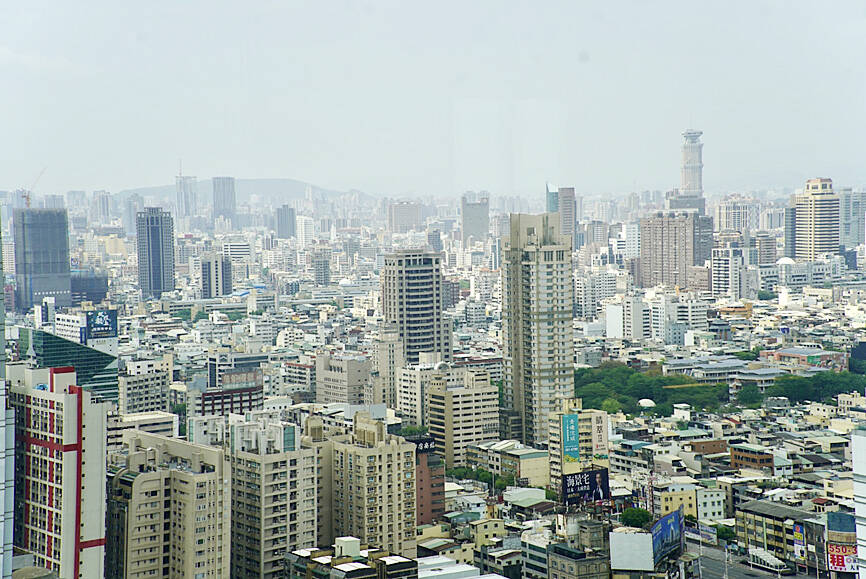The housing market might remain soft, but a hard landing is unlikely after the Ministry of the Interior on Tuesday promulgated complimentary measures to bans on transfers of presale housing purchase agreements, analysts said.
The ministry proposed the complimentary measures after the Legislative Yuan passed amendments to the Equalization of Land Rights Act (平均地權條例) in January, as it seeks to curb speculation in the presale property market and set heavy fines for market manipulation.
Luxury home sales would likely take a hit as the amendments require “private legal entities” — including private organizations and nonprofit groups — to obtain regulatory approval before buying real estate and bars them from reselling property within five years.

Photo: CNA
Meanwhile, a reward mechanism for whistle-blowers to report potential fraud or other illegal housing transactions would be created, the amendments say.
The bans and unfavorable regulations in the amendments have added pressure to the presale housing market, with transfers of presale contracts plunging to NT$85 billion (US$2.77 billion) in February from a monthly average of NT$180 billion in the final quarter of 2021, Sinyi Realty Inc (信義房屋) said.
The bans, which take effect 20 days after promulgation, would not limit purchases of presale houses to buyers with real demand, but short-term investors would likely exit the market, Sinyi research manager Tseng Ching-der (曾敬德) said in a statement on Tuesday.
Tseng said the bans would stretch resale deals, although they are not retroactive and would not affect existing purchase agreements.
The bans include exemptions for sellers with compelling reasons such as prolonged unemployment, critical illness, death and other major economic changes, he added.
Great Home Realty Co (大家房屋) head researcher Mandy Lang (郎美囡) agreed, saying the market has largely factored in the restrictions, with property transactions continuing to fall from the second half of last year.
However, H&B Realty Co (住商不動產) chief researcher Jessica Hsu (徐佳馨) voiced concern that cash-strained developers might exit the market after the amendments take effect, leaving presale house buyers at a loss.
Regarding the outlook for housing prices, Sinyi last week released a survey showing that up to 51 percent of the 1,150 respondents expected prices to fall this quarter, the highest percentage since the second quarter of 2020.
The survey conducted between March 15 and 22 found that 21 percent of respondents expected prices to rise this quarter, while 28 percent said prices would remain flat from last quarter.
However, a survey by Cathay Financial Holding Co (國泰金控) conducted from April 1 to 7 showed that 52 percent of the 14,489 respondents expected housing prices to continue to rise more than 3 percent over the next six months, despite several central bank interest rate increases since March last year.
Additional reporting by Kao Shih-ching

Taiwan’s long-term economic competitiveness will hinge not only on national champions like Taiwan Semiconductor Manufacturing Co. (TSMC, 台積電) but also on the widespread adoption of artificial intelligence (AI) and other emerging technologies, a US-based scholar has said. At a lecture in Taipei on Tuesday, Jeffrey Ding, assistant professor of political science at the George Washington University and author of "Technology and the Rise of Great Powers," argued that historical experience shows that general-purpose technologies (GPTs) — such as electricity, computers and now AI — shape long-term economic advantages through their diffusion across the broader economy. "What really matters is not who pioneers

In a high-security Shenzhen laboratory, Chinese scientists have built what Washington has spent years trying to prevent: a prototype of a machine capable of producing the cutting-edge semiconductor chips that power artificial intelligence (AI), smartphones and weapons central to Western military dominance, Reuters has learned. Completed early this year and undergoing testing, the prototype fills nearly an entire factory floor. It was built by a team of former engineers from Dutch semiconductor giant ASML who reverse-engineered the company’s extreme ultraviolet lithography (EUV) machines, according to two people with knowledge of the project. EUV machines sit at the heart of a technological Cold

TAIWAN VALUE CHAIN: Foxtron is to fully own Luxgen following the transaction and it plans to launch a new electric model, the Foxtron Bria, in Taiwan next year Yulon Motor Co (裕隆汽車) yesterday said that its board of directors approved the disposal of its electric vehicle (EV) unit, Luxgen Motor Co (納智捷汽車), to Foxtron Vehicle Technologies Co (鴻華先進) for NT$787.6 million (US$24.98 million). Foxtron, a half-half joint venture between Yulon affiliate Hua-Chuang Automobile Information Technical Center Co (華創車電) and Hon Hai Precision Industry Co (鴻海精密), expects to wrap up the deal in the first quarter of next year. Foxtron would fully own Luxgen following the transaction, including five car distributing companies, outlets and all employees. The deal is subject to the approval of the Fair Trade Commission, Foxtron said. “Foxtron will be

INFLATION CONSIDERATION: The BOJ governor said that it would ‘keep making appropriate decisions’ and would adjust depending on the economy and prices The Bank of Japan (BOJ) yesterday raised its benchmark interest rate to the highest in 30 years and said more increases are in the pipeline if conditions allow, in a sign of growing conviction that it can attain the stable inflation target it has pursued for more than a decade. Bank of Japan Governor Kazuo Ueda’s policy board increased the rate by 0.2 percentage points to 0.75 percent, in a unanimous decision, the bank said in a statement. The central bank cited the rising likelihood of its economic outlook being realized. The rate change was expected by all 50 economists surveyed by Bloomberg. The